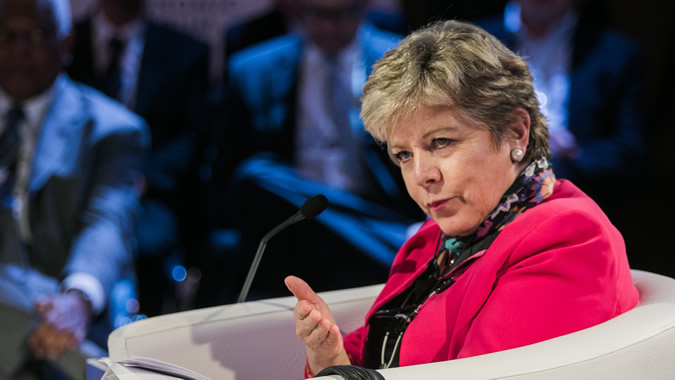Alicia Bárcena: "The Current Development Model is Unsustainable - Equality and Sustainability Require Changing the Conversation between the State, the Private Sector and Citizens”
ECLAC’s Executive Secretary gave presentations on various panels at the World Economic Forum on Latin America 2016, held in Medellin, Colombia.

Markets should be the result of renewed, innovative and better quality public-private alliances with a medium- and long-term vision that incorporates economic and social inclusion and environmental sustainability criteria in Latin America and the Caribbean, said Alicia Bárcena, ECLAC’s Executive Secretary, during the World Economic Forum on Latin America and the Caribbean 2016 held on Thursday and Friday in Medellin, Colombia.
This renewed equation should translate into investments in infrastructure, clean energy, sustainable urban transportation and the development of a single regional digital market, to name a few initiatives, said the most senior representative of this United Nations organization.
The World Economic Forum (WEF) annual event in Latin America was inaugurated by the Presidents of Colombia, Juan Manuel Santos, and Argentina, Mauricio Macri, and brought together leaders from all sectors of 44 countries to discuss key matters for sustainable development in the region.
“In the context of the current economic slowdown, the region must take urgent steps to avoid falling further behind the industrialized countries, while also preserving the significant social gains it achieved during the commodity price supercycle, which has now come to an end,” said Bárcena, who participated as a moderator and speaker on various panels at the meeting in Medellin.
The senior representative proposed “changing the conversation between the State, the private sector and citizens” so that all actors—both individually as well as through new national, regional and global alliances—innovate as they construct a future with equality of rights and environment sustainability, in line with the commitments of the 2030 Agenda for Sustainable Development, adopted last year.
Strategies must be urgently defined to carry out a progressive structural change in the region’s economies, which promotes knowledge- and technology-intensive sectors along with a big environmental push, the Executive Secretary of the Economic Commission for Latin America and the Caribbean (ECLAC) emphasized.
“Social issues are not played out in the social sphere alone,” Alicia Bárcena said and shared some of the main proposals in the last institutional document Horizons 2030: Equality at the Centre of Sustainable Development, presented a few weeks ago in Mexico.
On Thursday, June 16, Bárcena moderated the panel “Safeguarding Social Gains,” in which the speakers were Simón Gaviria, Minister of National Planning of Colombia; Aura Leticia Teleguario, Minister of Labor and Social Welfare of Guatemala; Rebeca Grynspan, Secretary-General of the Ibero-American General Secretariat (SEGIB); Arvan Chan, Vice President of International Operations at Centene Corporation; and Ana Lucía Cepeda, founder of Bolsa Rosa of Mexico.
That same day, she participated in other sessions where debates centered on subjects such as the economic growth prospects of Latin America and the Caribbean in the framework of the so-called Fourth Industrial Revolution, and gaps in innovation and competitiveness versus other regions of the world.
On Friday, Bárcena moderated the panel entitled “Designing Tools for Trust and Integrity in Latin America,” where participants discussed the topic of transparency and anti-corruption policies. They included Thelma Aldana, Attorney General of Guatemala; Mauricio Cárdenas, Minister of Finance and Public Credit of Colombia; Carlos Fernández, President of Paraguay’s Central Bank; Federico Gutiérrez, Mayor of Medellin; Patricia Menéndez-Cambó, Vice President of Greenberg Traurig (United States); and Sipho Pityana, Chairman of AngloGold Ashanti (South Africa), among other prominent figures.
On that panel, Bárcena emphasized the need to build more trust with the citizenry through new coalitions and instruments that ensure greater transparency and participation.
ECLAC’s Executive Secretary spoke on Friday on the panel entitled “Implementing the Sustainable Development Goals (SDGs),” where she participated again with Colombian Minister Simón Gaviria, as well as Sebastián Cabello, Head of GSMA Latin America (United Kingdom) and Macarena Mo, an environmental sustainability consultant from ORT University in Uruguay, with the moderation of John Hewko, General Secretary of Rotary International.
Bárcena underlined the broad margins for innovation existing between governments, the private sector and citizens in areas such as financing and joint investment, development plans at a national and local level, business models, legal frameworks and the use of big data for achieving the SDGs.
Finally, Bárcena participated in a special session on Cuba’s economy, where she was joined by María Claudia Lacouture, Minister of Trade, Industry and Tourism of Colombia; Rodrigo Malmierca Díaz, Cuba’s Minister of Foreign Trade and Foreign Investment; and Deborah Rivas Saavedra, General Director of Foreign Investment at the Ministry of Foreign Trade of Cuba, with the moderation of Marisol Argueta de Barillas, Head of WEF for Latin America.
On that panel, ECLAC’s Executive Secretary said that Cuba is striving to update its economic model on the basis of a citizenry that is prepared, trained and aware of its rights. She emphasized the importance of the end of the blockade to enable transactions in dollars and foster a real opening to foreign investment, key factors for productive diversification.
More information:
- Alicia Bárcena’s Opinion Column: Rethinking the Public-Private Alliances in Latin America and the Caribbean to achieve the Sustainable Development Goals.
- Photo Gallery.
For queries, contact ECLAC’s Public Information Unit.
E-mail: prensa@cepal.org; Telephone: (56 2) 2210 2040.
Follow us on: Twitter, Facebook, Flickr, YouTube and Google+.
Related content
Rethinking public-private partnerships in Latin America and the Caribbean to achieve the Sustainable Development Goals
Op-ed by Alicia Bárcena, Executive Secretary of ECLAC, in the framework of the meeting of the World Economic Forum in Medellín, Colombia (June 2016).
Subregional headquarter(s) and office(s)
Related link(s)
Country(ies)
- Latin America and the Caribbean
Related project(s)
Contact
Public Information Unit
- prensa@cepal.org
- (56 2) 2210 2040